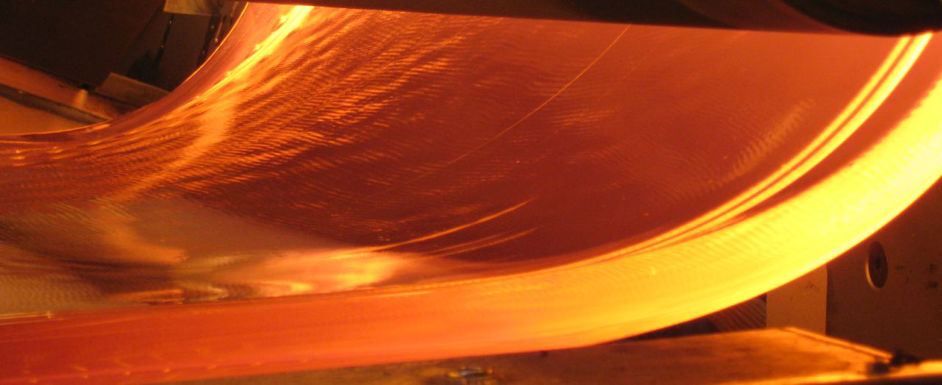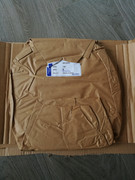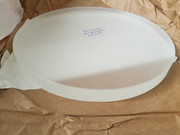- This topic has 11 replies, 4 voices, and was last updated 5 years, 8 months ago by
Giulio TiberinI .
-
AuthorPosts
-
17 July 2017 at 1:20 #10032
So guys, Next week should get me the blank borosilicate Schott 300mm with 25mm thick that I ordered. The blank is not working, except for the rear part that turns out to be already smoothed. Same time I also ordered abrasives etc..
After I made myself a better idea about the focal be developed, I decided that I will opt for a F6 focal then 1800mm. From a structural point of view I'll see if adopt the low-riding technique to lower the eyepiece to my lack of capacity (170cm), but this is something that the current primary optics has little to do.
According to my calculations I will have to dig a 3,125mm arrow but I have many doubts about the way to go to get there.
Meanwhile, the abrasive at my disposal are:
In corundum grains 80, 180 e 320
Aluminum oxide Microgrit WCA 25my, 15my, 9my, 5my, 3my
Cerium oxide (Cer-Skx)I have read and learned from your articles type and use of various types of passed and I read the article on the generation of pronfodità but I still see all tarnished

As it goes with the grain 80? When I go to 180? And with that as I go down? And so forth… I realized that when I arrive at the required depth before having to change grain can “temporize” making past 1/3 COC reversing tool and mirror in an alternating manner until it reaches a uniform surface but did not understand when the.
Not wanting to buy two blank sure to use one tool I have to create me as a suitable tool but here I saw a myriad of solutions, you advice on? I create the classic tool seen in several guides, the fact that with ceramic mattonelline but do not know whether we are better or worse methods.
Oh well, I am from the party, we hope not to lose 17 July 2017 at 3:33 #10033
17 July 2017 at 3:33 #10033And now… let's start !

a premise: If you ask if the blank borosilicate was “annealed” at a room temperature oven and slow and controlled cooling. Without this procedure, for the blank from the plates “rolled” Schott, there is no guarantee of the absence of internal tensions.Regarding the depth I can tell you how I would do, since even in this case there are different opinions:
IO scenderei up to 3,1 mm con la 80, so I levo I immediately thought of the excavation and I worry then small adjustments (few hundredths of a millimeter), to leave the priority to the regularization and surface finish.Also because the aluminum oxide that you will use after the carborundum 320 ( it is important to always verify that it is controlled granulometry ) while remaining a material with a very high hardness, it is efficient to add / remove depth , while it is going very well for grinding the end.
( the finest one I also used in polishing instead of cerium with good results ).Its grains, when viewed under a microscope, They are at the beginning equipped with sharp edges but that is “round” with ease after a short use and you will notice that with respect to the silicon carbide must be replaced / regenerated with more frequency, exactly for this reason.
for the tool could also use common calcium-sodium glass 300/15 mm, Low cost , from readily available and with the advantage of working up the end with a full-diameter tool.
17 July 2017 at 8:48 #10036Well:L'”mist”It is normal
 the conditions of any new activities undertaken.
the conditions of any new activities undertaken.Telegraficamsnte rispondrei to your well domandd:
1) With the whetstone make a bevel mirror and tool that has a wide facet about 3mm
2)With grana 80 early and get to the final arrow with past chordal
3) with past 1 / 3D regularize the excavation so that it reaches the edge of the mirror, and after walking the grain 180, always with past 1 / 3D.
4) If you should happen that the arrow mark…simply invert the speccho / tool position and recoveries ball.17 July 2017 at 9:12 #10040the tool would be better if it were glass 19mm .Or maybe made with 15mm thick glued with epoxy 2dischi (but ask the price because the glazier think you faebbe them pay as 20m, because for him it is double work, and the thickness has no effect on his work).
17 July 2017 at 11:06 #10054Maximus the blank is borofloat 33 but I do not think it is annealed. The glass problem as the tool is that I very much costs. I'm not going to pay 85 euro for a calcium sodium blank 19mm without even the edges machined. The prices you find are those, glassworks in my area not even consider me for such work. If industrial glassworks not even get confused for a disc 30cm, if they are common and glass works have not even have to order it or they will cut badly and still pay a blunder. It's not about the money itself but it annoys me just rub me… Pay a calcium sodium glass almost as much of a blank 25mm it seems like a scam borosilicate.
 17 July 2017 at 12:06 #10057
17 July 2017 at 12:06 #10057Well, but the “float” It is a different manufacturing process from “rolled”, I think it's less affected by problems of internal tensions ( Mirco or Giulio might be more accurate than me ) The borofloat as glass composition is identical to Supremax, It differs precisely for the production process, until “flotation” for borofloat, on conveyor rollers for SUPREMAX for thicknesses up to 56 mm.

You actually that price seems exaggerated, However, there is a company that is located a few hundred km from you ( umbriavetro.it ), a calcium-sodium thickness 19 mm cut with Waterjet and beveled edges to take it away at least half ( at least the last time I heard them last year )
17 July 2017 at 12:20 #10059In these gjorni I am on vacation and I can hardly scriere with the damn phone and my big fingers…..In fact I believed to have already sent (but now I saw that it is not so) this important document almost tutorial on preparing plaster tools with piasrtrelle ceramics embedded in plaster (… or alternatively with hex nuts M12 or so, embedded in plaster, as seen in a video on youtube Gordon waite).
Putropoo is in French, but it is interesting MOOLTO!
17 July 2017 at 13:12 #10066Great, do we now look. Instead they send me pitch is marked “Pitch 26°”, it's right?
17 July 2017 at 22:34 #10086gradation 26 Not accompanied by a manufacturing brand does not tell me much, because it is a little high (we say that might be “summer”) if it refers to the operating temperature and must reach the field by the sum of temperature. environment + the resulting friction of lavoraz.
As usual, temperature range. Work is close to those indicated by the following image on the pitch black Gugolz brand

I, for example by working with winter temp environment 20 degrees, use the Gugolz #55
It's a hassle, but if the hardness of the field does not show addguata (it is too soft that gives too much without working; or too hard, namely, which works without damaging and excavation locally) It can vary.
20 July 2017 at 11:16 #1013820 July 2017 at 11:31 #10141Uh, WOW beautiful…

 5 August 2019 at 22:39 #11488
5 August 2019 at 22:39 #11488Today 5/8/19 made visible again all the images accompanying this discussion (I change address from postimg.cc to postimg.cc)
-
AuthorPosts
- You must be logged in to reply to this topic.

